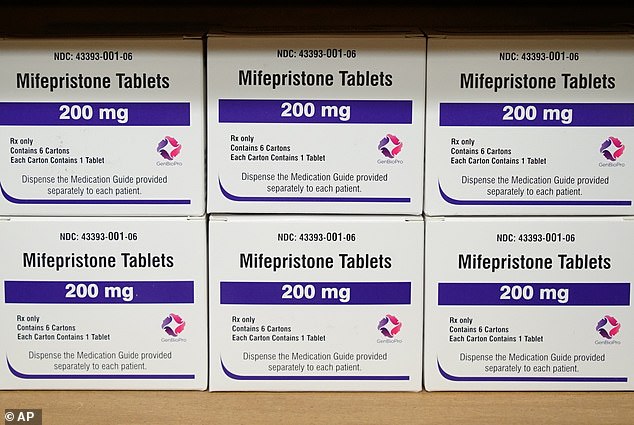The Supreme Court upheld access to the abortion pill mifepristone and rejected a lawsuit that would have impacted access to abortion not only in states where abortion is restricted but throughout the country.
It is the conservative court’s first major decision on reproductive rights since it overturned Roe v Wade, which ended the constitutional right to abortion nationwide in 2022.
The country’s highest court ruled that the plaintiffs in the case did not have standing to bring their lawsuit.
Justice Brett Kavanaugh wrote the decision for the court’s unanimous decision.
The group had raised issues with the Food and Drug Administration’s approval of the drug more than 20 years ago.
The ruling is a major setback for anti-abortion groups.
Mifepristone is one of the drugs used in the medical abortion process and is used in more than half of all abortions in the US. More than 5.6 million women have used mifepristone since it was approved in the year 2000.
The case FDA v. Alliance for Hippocratic Medicine involved a group of anti-abortion medical professionals who filed a lawsuit attempting to block access to the drug.
The court heard oral arguments in the case in late March, and the court majority seemed set to reject blocking access to or further restricting the commonly used abortion pill.
Mifepristone is used in more than half of abortions in the United States and has been used by more than 5.6 million women since its approval in 2000.
The case looked at actions taken by the FDA to relax restrictions around the pill in 2016 and 2021, making it easier to obtain nationwide, as many states have moved to further restrict abortion since Roe fell in 2022. .
The Supreme Court had two questions to examine: The first was whether the group had standing to bring the case and, if so, whether the FDA’s actions to facilitate obtaining the drug are legal.

During the arguments, the majority of the Supreme Court justices questioned the plaintiffs’ active standing to file the lawsuit.

Erin Hawley of Alliance Defending Freedom speaking in front of the Supreme Court after arguing on behalf of the Alliance for Hippocratic Medicine.

Jessica Ellsworth also argued in court on behalf of Danco, which manufactures mifepristone. She warned that the anti-abortion group’s opinions would not only affect mifepristone but could alter the approval of all drugs.
The Alliance for Hippocratic Medicine first challenged the FDA in the conservative U.S. District Court for the Northern District of Texas on several grounds in November 2022.
On April 7, 2023, Judge Matthew Kacsmaryk sided with the plaintiffs and attempted to block the FDA’s approval of mifepristone. But the Justice Department appealed the decision to the Fifth Circuit Court of Appeals.
In August 2023, the Fifth Circuit court ruled to reinstate some of the pre-2016 restrictions but not remove the drug from the market, and the Supreme Court upheld the stay.
Mifepristone is used in more than half of all abortions in the United States.

Abortion is also expected to be a major issue in the 2024 presidential election after the reversal of Roe v Wade played a pivotal role in the midterm elections.
Research by the Guttmacher Institute, a pro-abortion rights research organization, found that medication abortions in the United States accounted for 63 percent of all abortions last year.
Medical abortion is more accessible than procedural abortion. In 2021, 40 percent of facilities offering abortions only offered medication abortions.
The use of telemedicine and mail-order abortion pills has also increased in recent years. In 2020, only 7 percent of all providers used telemedicine and mailed abortion pills. In 2022, 31 percent were mailing abortion pills.
While 14 states have had near-total bans on abortion since the Supreme Court overturned Roe v. Wade in 2022 and more than a handful of additional states have implemented additional restrictions on abortion ranging from six to 18 weeks, several states that still have some access to abortion have greater restrictions on medication abortion.
Even though the FDA relaxed rules to allow other medical professionals, such as physician assistants and nurse practitioners, to prescribe abortion pills in addition to doctors, 15 states have laws requiring them to be provided by a doctor, according to Guttmacher’s tracking.
They also found that at least five states require patients to visit a doctor in person and at least one state, Arizona, has banned mail-in abortion pills.

Pro-abortion rights protesters gathered in front of the Supreme Court carrying signs and chanting. They warned that the case would not only affect abortion access in states that have banned it, but also in all 50 states, including those that have expanded access.

Anti-abortion rights protesters gathered with signs focused on women’s health and argued that “abortion pills kill.”
Before the decision, abortion rights advocates warned that the Supreme Court’s decision could have national implications.
Abortion has been a galvanizing issue since the Supreme Court overturned the landmark Roe v Wade decision and returned the issue of abortion rights to the states.


